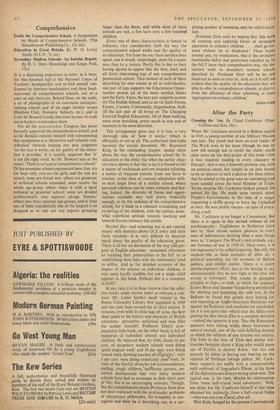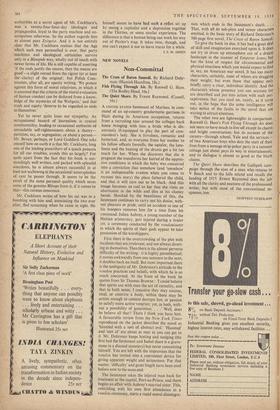After the Party
WHEN Mr. Cockburn arrived in a Balkan capital in 1945, a young member of our Military Mission met him. The youth had been an avid reader of The Week even in his teens (though he was by now old enough not to credit the claim—made once more on the dust-jacket of this book—that it was required reading in every chancery in Europe). And it was, I honestly promise you, with no political intent, but simply as an item bound to be of interest to such a glutton for these titbits, that he related to the great man an interesting (and true) scandal about the local Minister of Trade. To his surprise Mr. Cockburn looked pained. He pursed his lips. He made some remark about People's Governments in the tone of a verger requesting a skiffie group to leave the Cathedral at once. He was plainly sincere—in spite of every- thing, a naïf.
Mr. Cockburn is no longer a Communist. But there it is again in this second volume of his autobiography : Englishmen in Bucharest irked him by 'their almost sadistic pleasure in every item of information showing what a mess things were in.' Compare The Week's own attitude, e.g., our fortunes of war in 1919-4l. Once more, it is too ingenuous to be called hypocrisy. But still, the weakest bits in these memoirs of, after all, a political journalist, are his accounts of Balkan politics, and similar matter. There is a queer double-exposure effect, due to his having to say simultaneously that he was right at the time but wrong in retrospect. This results in passages, irritable or dopey or both, in which, for instance, Ernest Bevin and Senator Vandenberg are blamed for plotting and launching the cold war. In the Balkans he found that people were hoping for and expecting an Anglo-American liberation war against thelussians, and concludes (or concluded, for it is not quite clear which) that the Allies were putting the idea about. This is a complete delusion —indeed the opposite is true. That the Rumanian peasants were talking wildly about liberation is natural enough, one of the wish-fulfilling dreams to which the subjects of any tyranny are subject. The Jews in the time of Titus had similar mil- lenarian fantasies about a King who would come out of Parthia to destroy Rome : but this can scarcely be taken as having any bearing on the realities of Parthian foreign policy. Mr. Cock- burn supports his waffle with a comparatively mild outbreak of Journalist's Elbow, in the form of the diplomats-are-always-wrong syndrome. The typical one, in his view, obtains his information from 'some half-crazed local adventurer.' Well, not often, but Mr. Cookburn himself at that time obtained his, indirectly, from a half-crazed Stalin —who was not even a local, after all.
Otto Katz, hanged by the present Czechoslovak
authorities as a secret agent of Mr. Cockburn's, was a twenty-four-hour-day ideologist and propagandist, loyal to the party machine and un- scrupulous otherwise. So the author regards him as almost pure Zeitgeist. And it is not entirely clear that Mr. Cockburn realises that the Age which such men personified is over, that party machines and ideological certainties survive only in a Blimpish way, wholly out of touch with newer forms of life. He is still capable of asserting `if the ends justify the means, then the means are good'—a slight retreat from the rigour (or at least the 'clarity) of the original : but Polish Com- munists, after all, are openly writing, 'We protest against this form of moral relativism, in which it is assumed that the criteria of the moral evaluation of human conduct can be deduced from a know- ledge of the mysteries of the Weltgeist,' and that truth and equity 'deserve to be regarded as ends in themselves.'
Yet he never quite loses our sympathy. An occupational hazard of journalism is cynical sentimentality, leading to occasional outbursts of unreadable self-righteousness about a theory— partition, say, or segregation; or about a person— Mr. Bevan, perhaps, or Lord Goddard. One asks oneself how on earth it is that Mr. Cockburn, long one of the leading prescribers of a quack panacea for all our troubles, avoids this so largely? For quite apart from the fact that his book is out- standingly well written, and packed with splendid anecdotes, he is almost always successful in at least not wallowing in the occasional watersplashes of cant he 'passes through. It seems to be the result of the same personal quality which saves some of the genuine Blimps from it, if it comes to that—this curious innocence.
Mr. Cockburn writes of how his cat was in a bombing with him and, associating the two ever after, fled screaming when he came in sight. He
himself seems to have had such a reflex set up by seeing a capitalist and a depression together in the Thirties, or some similar experience. The difference is that a human being can work his way out of Pavlov's trap. It takes time, though, and one can't expect it not to leave traces for a while.
J. E. M. ARDEN



































 Previous page
Previous page